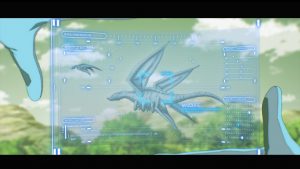In Short:
Astra Lost in Space is a twelve episode anime released by studio Lerche in 2019. Set in a future where faster than light travel is common, the show follows a group of high school students who are frighteningly transported from the surface of one planet into orbit above a distant unknown world by a strange energy sphere.
They should be dead, but because they were still wearing their all-purpose space suits after being dropped off at the start of their “planet camp” field trip, they are able to board a derelict spaceship drifting nearby which they soon name the Astra.
Safe, but with barely any food or water, the group must survive interpersonal conflicts, technical and environmental challenges, and a surprising amount of intrigue as they chart a months long, planet hopping course back home.
Suggested Watch Minimum: 2 episodes. Astra Lost in Space has a story that unfurls quite a bit as it goes, but the second episode is a good place to judge the show since it forms the basic template the rest of the series follows.
Full Review:
 Astra Lost in Space is one of my favorite anime of all time… which makes it funny that I’m going to start off this review by encouraging you to stick with it all the way to the end of the first episode. The first two minutes of the show are great. It starts with one of our nine main characters frightened and alone, tumbling out of control in their spacesuit above an unknown planet. The final third of the episode is really good, too, as we see our somewhat antagonistic group work together for the first time. But, for as great as this show is, it kinda starts off slowly. After the intriguing open that got me hooked, the next twenty or so minutes had me growing more and more concerned for the show’s direction. They are filled with an odd mix of goofiness and cliches and hijinks just seemed off. Instead of a cool space adventure that the opening promised, it felt like the show was going to be a dumb, goofy, slapstick comedy with no real core or purpose.
Astra Lost in Space is one of my favorite anime of all time… which makes it funny that I’m going to start off this review by encouraging you to stick with it all the way to the end of the first episode. The first two minutes of the show are great. It starts with one of our nine main characters frightened and alone, tumbling out of control in their spacesuit above an unknown planet. The final third of the episode is really good, too, as we see our somewhat antagonistic group work together for the first time. But, for as great as this show is, it kinda starts off slowly. After the intriguing open that got me hooked, the next twenty or so minutes had me growing more and more concerned for the show’s direction. They are filled with an odd mix of goofiness and cliches and hijinks just seemed off. Instead of a cool space adventure that the opening promised, it felt like the show was going to be a dumb, goofy, slapstick comedy with no real core or purpose.
Fortunately, that feeling turned out to be extremely misplaced. Once I got past those awkward twenty minutes in the spaceport, there was a good episode and a truly great show waiting beyond. So, what I’m saying is, stick with it. Even the first episode ends up being good, but you do need to wait until the second half before it really kicks into gear. Once it did, Astra Lost in Space went on to surprise me with a very strong cast of characters, a good amount of light sci-fi, and a fun, well written story that steadily grew more tense and interesting the further the show went on. Let’s get into each of those a bit.
 For characters, we have an ensemble cast with no real main character. Instead, we get nine individuals with drastically different personalities. They all have various strengths and weaknesses that come into play at different times throughout the series. Take Aries, the frightened girl we see in the show’s first few seconds. Turns out, when not fearing for her life, she is a bubbly, good-natured airhead, but she’s also someone whose strong sense of compassion and photographic memory are early keys to bringing the Astra’s misfit crew together. Or take Kanata, his “fake it until you make it” attitude and general goofiness are offset by his reliable leadership and world class athleticism, two qualities that save the day multiple times over.
For characters, we have an ensemble cast with no real main character. Instead, we get nine individuals with drastically different personalities. They all have various strengths and weaknesses that come into play at different times throughout the series. Take Aries, the frightened girl we see in the show’s first few seconds. Turns out, when not fearing for her life, she is a bubbly, good-natured airhead, but she’s also someone whose strong sense of compassion and photographic memory are early keys to bringing the Astra’s misfit crew together. Or take Kanata, his “fake it until you make it” attitude and general goofiness are offset by his reliable leadership and world class athleticism, two qualities that save the day multiple times over.
Without going into too much detail, Astra Lost in Space is a story where every character is essential, where several of the characters get a good bit of backstory, and where even their flaws are there for a reason. While the cast’s early banter and interpersonal conflicts can be a little annoying, they set the show up in a great position to see its makeshift crew slowly come together as a family by the end. It was a lot of fun watching these characters bounce off each other and change for the better as the series progressed.
 As a science fiction adventure, Astra Lost in Space is great. The core loop of the show is that in order to get home, the crew of the Astra needs to keep traveling to new worlds closer and closer to their end goal. They chart a course between habitable worlds that lets them go planetside and resupply their limited stores of food and water after each faster than light jump. The worlds they visit and the challenges they face are just good basic sci-fi. The show deals with things like alien ecosystems, micrometer strikes, natural disasters, and differences in gravity, but it does so in fun ways. This is a humorous adventure anime, not a science documentary, but the series still does a decent job on the science, too.
As a science fiction adventure, Astra Lost in Space is great. The core loop of the show is that in order to get home, the crew of the Astra needs to keep traveling to new worlds closer and closer to their end goal. They chart a course between habitable worlds that lets them go planetside and resupply their limited stores of food and water after each faster than light jump. The worlds they visit and the challenges they face are just good basic sci-fi. The show deals with things like alien ecosystems, micrometer strikes, natural disasters, and differences in gravity, but it does so in fun ways. This is a humorous adventure anime, not a science documentary, but the series still does a decent job on the science, too.
Finally, there’s the show’s overarching story of why these high school kids were transported into the cold, unforgiving vacuum of space in the first place. A lot of the early cliches and tropes and character oddities that feel like things you’ve seen in anime before actually matter as the story moves along. We have the main story of our nine crew members making their way back home, but the secondary story of what’s waiting for them there also comes into play part way through the series. Astra Lost in Space would make a pretty good sci-fi adventure if all it did was take our characters from one interesting planet to the next, but the way its various large and small plots fit together makes the series something special. There’s drama and sadness, but also some pretty nice moments of courage, humor, bonding, and forgiveness, as well. For a show that is largely a lighthearted adventure, the amount of stuff I can’t even hint at in this part of the review for fear of giving away spoilers is fairly extensive!
 Graphics wise, Astra Lost in Space is decent, but not stellar, if you’ll pardon the pun. Character designs are good, and the show has a nice colorful vibe to it, but things like movement and overall animation are typically fine but not overly compelling. There’s far worse shows than this one, but it won’t be topping any animation best of chart’s either. If I had to criticize anything specifically, I’d point out that the computer rendering of the Astra is just not as good as I wish it was. Planetes, which came out some sixteen years earlier, has better ship animation by far, and most of its ships are completely hand drawn.
Graphics wise, Astra Lost in Space is decent, but not stellar, if you’ll pardon the pun. Character designs are good, and the show has a nice colorful vibe to it, but things like movement and overall animation are typically fine but not overly compelling. There’s far worse shows than this one, but it won’t be topping any animation best of chart’s either. If I had to criticize anything specifically, I’d point out that the computer rendering of the Astra is just not as good as I wish it was. Planetes, which came out some sixteen years earlier, has better ship animation by far, and most of its ships are completely hand drawn.
Soundwise, Astra Lost in Space is good. Sound effects are good. Voice acting is good. And its music is good, as well. You do get some nice, varied, upbeat music for the action scenes. I also like the opening and closing themes. Maybe they aren’t super special, but, again, they’re nicely upbeat and pair well with their on screen animations. Oh, and keep an eye out for evolving opening and closing credits that change over time and add new elements as the crew encounters them. The closings, in particular, show fun little slices of the crew’s life in their offscreen downtime as they travel from planet to planet.
All In All:
Astra Lost in Space is a bigger and better science fiction adventure than it first appears. Its characters have more depth, its worlds have more science, and its story has more intrigue, drama, humor, and heart than you might expect from the first few episodes. And, somehow, it achieves all this without losing its sense of friendship, family, and fun.
 Illegal Cloning. Cruel parents. Attempted murder via wormhole. Political intrigue. World war. Planetary evacuation. An apocalyptic asteroid strike. Massive government coverup. Secret rewritten history. Royal assassinations. Yeah, I wasn’t kidding when I said the amount of things I couldn’t talk about were extensive!
Illegal Cloning. Cruel parents. Attempted murder via wormhole. Political intrigue. World war. Planetary evacuation. An apocalyptic asteroid strike. Massive government coverup. Secret rewritten history. Royal assassinations. Yeah, I wasn’t kidding when I said the amount of things I couldn’t talk about were extensive!
It’s pretty amazing how many quality character beats and story beats Astra Lost in Space manages to fit into the space of twelve episodes. Some of them, like the cloning plot, take quite a while to make it out into the open. The way the show slowly introduced one bad parent after another was pretty interesting, because in isolation, any one of those parents could be written as a typical absurdly bad anime parent. But, as more and more of the Astra’s crew was revealed to have had bad childhoods, it eventually became apparent that we were looking at a major plot point instead of cliched writing.
I think it might have been the smaller things that I appreciated the most, however. Like the way Aries’ photographic memory was introduced as a convenient solution during a chase scene, but then kept coming back to help solve more and more serious problems as the story went on. Or how Kanata’s uncaring father and tough physical training was the key to rescuing so many of the characters over the course of the show. The scene were he lifts Ulgar out of the water one-handed actually kinda got to me. All that training really did serve a purpose!
 Another fun detail that was really easy to miss were the Lucy Lum advertisements in the spaceport all the way back in the first episode. I wonder if anybody out there made the connection between those holographic posters and Yun-Hau’s appearance. I certainly didn’t.
Another fun detail that was really easy to miss were the Lucy Lum advertisements in the spaceport all the way back in the first episode. I wonder if anybody out there made the connection between those holographic posters and Yun-Hau’s appearance. I certainly didn’t.
But I think my favorite little thing the show did was revisit Kanata’s cheesy ultimate dive-bomb from the first episode. As noted up in the main review, that early scene in the spaceport almost turned me off the show, but by the end it was mirrored in one of the most tense and heartwarming moments in the entire series. That was pretty cool.